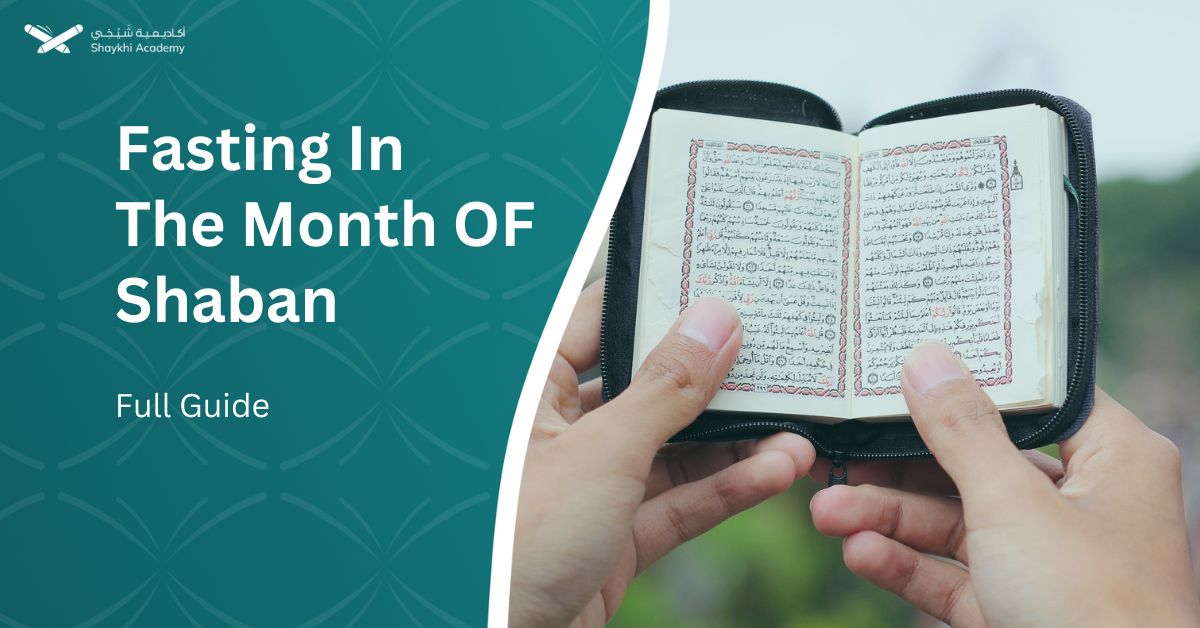Fasting in Shaban, a Sunnah practice highly recommended in Islam, offers a spiritual boost before Ramadan. By fasting on key days like the 13th, 14th, and 15th, we seek forgiveness, enhance worship, and prepare their hearts for the holy month.
Prophet Muhammad (peace be upon him) often fasted during this time, emphasizing its role in purifying deeds as they are presented to Allah. Shaban is a perfect opportunity for self-reflection, increased devotion, and connecting deeply with Allah’s mercy, especially on the blessed night of Laylatul Baraat.
Fasting in Shaban :
Fasting in Shaban refers to the voluntary act of abstaining from food, drink, and other lawful physical needs during daylight hours throughout some fasting days in the month of Shaban in the Islamic lunar calendar.
Unlike the obligatory fasting observed during the month of Ramadan, fasting in Shaban is considered a recommended Sunnah practice in Islam. It is encouraged as a means of spiritual preparation and anticipation for Ramadan, allowing Muslims to strengthen their relationship with Allah, seek forgiveness for their sins, and engage in increased acts of worship.
Fasting in Shaban brings numerous spiritual rewards and blessings, as it demonstrates dedication to religious observance and a desire to draw closer to Allah in anticipation of the upcoming month of Ramadan.
Fasting in the month of Sha’ban is highly recommended in Islam. Various narrations highlight that Prophet Muhammad (peace be upon him) often observed frequent fasts during this month.
Prophet’s Practice of Fasting in Sha’ban
It is reported that the Prophet used to fast almost the entire month of Sha’ban. Umm Salamah (may Allah be pleased with her) said:
“I never saw the Prophet fasting two consecutive months except that he joined Sha’ban with Ramadan.”
This narration was collected by Ahmad, Abu Dawood, and others, and authenticated by Al-Albani (Sahih Abu Dawood 2048).
However, other reports suggest that the Prophet did not fast the whole month but most of it. Aisha (may Allah be pleased with her) narrated:
“The Prophet never fasted a full month except Ramadan, but I never saw him fast in any month more than he did in Sha’ban.”
This narration was collected by Muslim (1156).
Reconciling the Hadiths
Scholars have interpreted these differences in various ways:
- Variation in years: In some years, the Prophet may have fasted the entire month, while in others, he fasted most of it. This opinion was favored by Sheikh Ibn Baz.
- Language usage: Some scholars explained that saying “the entire month” may simply mean “most of the month,” as this is permissible in Arabic usage.
The correct understanding is likely that the Prophet did not fast all of Sha’ban but most of it. Supporting this, Aisha (may Allah be pleased with her) said:
“I do not know of the Prophet fasting a whole month except Ramadan.”
(Muslim 746)
Wisdom Behind Fasting in Sha’ban
The Prophet explained the reason for his frequent fasting in Sha’ban in a narration by Usama ibn Zaid:
“That is a month people neglect between Rajab and Ramadan. It is a month in which deeds are presented to the Lord of the worlds, and I like that my deeds be presented while I am fasting.”
(Narrated by Al-Nasa’i, graded as authentic by Al-Albani in Sahih al-Nasa’i 2221)
Thus, fasting in Sha’ban is a recommended act, preparing believers for Ramadan while seeking Allah’s pleasure as their deeds are raised.
Shaban 13 14 15 fasting:
Fasting the “white days” in Shaban is recommended (which are the 13th, 14th, and 15th days of the month). In 2025 they will fall on 23, 24, and 25 February. By fasting these days, a Muslim combines the virtues of fasting the white days and fasting days of Shaban.
Fasting on the 13th, 14th, and 15th days of the Islamic month of Shaban is recommended in Islam. In 2025, these days will fall on February 23rd, 24th, and 25th. These days, known as the “white days,” hold special significance and offer spiritual rewards for those who observe fasting. By abstaining from food, drink, and other physical needs during daylight hours on these days, Muslims seek closeness to Allah, seek forgiveness for their sins, and increase their devotion to worship.
Benefits And Virtues of fasting in the month of Shaban
Shaban holds special significance in Islam, and there are several virtues associated with this month. Overall, fasting in the month of Shaban is a virtuous act that brings numerous spiritual benefits and rewards for believers who observe it with sincerity and devotion. Here the are the top virtues of fasting in the month of Shaban:
1. Deeds are raised up to Allah in Shabban:
It is a month in which the deeds are raised up to Allah. Ibn al-Qayyim, may Allah have mercy on him, said:
“Indeed, the deeds of the entire year are raised in Shaban. – فان عمل العام يرفع في شعبان “.
2. Prepare for Ramadan
Fasting in Shaban helps muslims prepare themselves for the upcoming holy month of Ramadan. It is as a training ground for self-discipline, self-control, and strengthening one’s relationship with Allah. Because Muslims tend to forget the importance the month of Shaban,the Prophetﷺ used to fast a lot in the Month of Shaban.
3. Shaban contains the Laylatul Baraat:
on the 15th night of Shaban, known as” Laylatul Baraat”, it is special for forgivness and mercy.During shaban, good deeds you perform are multiplied in reward.
4. Sunnah Practice:
Fasting in Shaban is a recommended Sunnah practice of Prophet Muhammad (peace be upon him). Following the example of the Prophet allows Muslims to earn spiritual rewards and draw closer to Allah.
5. Increased Worship:
Fasting in Shaban provides an opportunity for increased worship, including prayers, recitation of the Quran, and supplication. It is a time for Muslims to strengthen their connection with Allah and seek His forgiveness.
6. Forgiveness of Sins:
Fasting in Shaban results in the forgiveness of sins. By sincerely observing fasting and engaging in righteous deeds during this month, Muslims seek Allah’s mercy and forgiveness for their past transgressions.
7. Intercession:
It is narrated that the fasting person is granted intercession on the Day of Judgment. Fasting in Shaban is therefore seen as a means of attaining Allah’s favor and mercy in the Hereafter.
Hadith on fasting in the month of shaban
Shaban is a precious month in Islam that carries a lot of virtues and hidden spiritual treasures. The prophet Muhammad, peace be upon him, mentioned some important insights through his hadiths regarding the virtues and practices related to this holy month. These hadiths remind us of the significance of this blessed month and teach us lessons to seek closeness to Allah, act good deeds, and work on our spiritual growth. Also, they shed light on the importance of the night of mid-Shaban. Let’s learn some of these Hadiths:
Abu Musa reported:
“The Messenger of Allah, peace and blessings be upon him, said, “Verily, Allah looks down in middle night of Shaban and He forgives all of His creatures, except for an idolater or one filled with malice.”
إِنَّ اللَّهَ لَيَطَّلِعُ فِي لَيْلَةِ النِّصْفِ مِنْ شَعْبَانَ فَيَغْفِرُ لِجَمِيعِ خَلْقِهِ إِلَّا لِمُشْرِكٍ أَوْ مُشَاحِنٍ
(Source: Sunan Ibn Mājah 1390)
This hadith reminds us of the importance of seeking forgiveness. The hadith told us that Allah looks down at His creation on the middle night of Shaban and He forgive all of His creatures, except for an idolater and one who hates other people.
Usamah ibn Zayd also reported:
“I said, “O Messenger of Allah, I do not see you fasting any month as much as you fast during Shaban.” The Prophet, peace and blessings be upon him, said, “It is a month people neglect between Rajab and Ramadan. It is a month in which the deeds are raised to the Lord of the worlds, and I like for my deeds to be raised while I am fasting.”
ذَلِكَ شَهْرٌ يَغْفُلُ النَّاسُ عَنْهُ بَيْنَ رَجَبٍ وَرَمَضَانَ وَهُوَ شَهْرٌ تُرْفَعُ فِيهِ الْأَعْمَالُ إِلَى رَبِّ الْعَالَمِينَ فَأُحِبُّ أَنْ يُرْفَعَ عَمَلِي وَأَنَا صَائِمٌ
(Source: Sunan al-Nasā’ī 2357)
This Hadith tells us about the practice of Prophet Muhammad (peace be upon him) who used to fast a lot during the month of Shaban, especially in the white days. It reminds us to not ignore between Rajab and Ramadan and to do worship to attain the blessings associated with this sacred month. Furthermore, it is considered an opportune time for us to spiritually prepare ourselves for Ramadan.
Abu Tha’labah also reported: The Prophet, peace and blessings be upon him, said:
“On the middle night of Shaban, Allah looks down upon His creation and He forgives the believers, gives respite to the unbelievers, and He abandons the people of malice to their malice until they give it up.”
إِذَا كَانَ لَيْلَةُ النِّصْفِ مِنْ شَعْبَانَ اطَّلَعَ اللهُ إِلَى خَلْقِهِ فَيَغْفِرُ لِلْمُؤْمِنِ وَيُمْلِي لِلْكَافِرِينَ وَيَدَعُ أَهْلَ الْحِقْدِ بِحِقْدِهِمْ حَتَّى يَدَعُوهُ
(Source: Shu’ab al-Imān 3832)
This Hadith highlights the significance of the middle night of Shaban. On this blessed night, Allah raises the deeds of his servants on this day and leaves people of grudges to their malice. The 15th Shaban is also an opportunity for seeking Allah’s mercy, repentance and being forgiven for past and future sins. Additionally, it is a time when one’s needs can be fulfilled if we turn to Allah.
The dua for the month of Shaban:
According to Sayyiduna Anas Ibn Malik (radiyallahu’anhu), the Prophet Muhammad (sallallahu ‘alayhi wa sallam) would recite the following dua when the month of Shaban would begin:
“اللَّهُمَّ بَارِكْ لَنَا فِي رَجَبٍ وَشَعْبَانَ، وَبَلِّغْنَا رَمَضَانَ”
Translation: “O Allah, bless us in the months of Rajab and Shaban, and enable us to reach Ramadan.”
The dua teach us a beautiful way to seek Allah’s blessings and ask for His guidance and mercy during the months of Rajab and Shaban, leading up to the sacred month of Ramadan. It is a simple but powerful dua to express our desire for spiritual growth and preparation for the upcoming month of fasting and worship. Remember to make dua with sincerity and a humble heart. May Allah accept our prayers and grant us His blessings.
Learn the Quran with Shaykhi And Islamic Rulings
Learn the Quran with Shaykhi: Discover the beauty and wisdom of the Quran through our expert-led courses. Enroll now to deepen your understanding and connection with the divine scripture.
Learn Ramadan Rulings with Shaykhi: Prepare for the blessed month of Ramadan by gaining knowledge of its essential rulings and practices. Join our course to ensure a spiritually enriching Ramadan experience.
Arabic and Quran Courses: Explore our diverse range of Arabic and Quran courses designed for learners of all levels. Whether you’re a beginner or seeking advanced study, Shaykhi Academy offers tailored courses to suit your learning goals.

Conclusion:
Fasting during the month of Shaban is a significant Sunnah practice in Islam, offering Muslims a chance to spiritually prepare for Ramadan. Prophet Muhammad (peace be upon him) fasted frequently during this month, emphasizing its importance as a time when deeds are raised to Allah. Fasting during these days, particularly the 13th, 14th, and 15th—known as the “white days”—is encouraged for its spiritual benefits, such as seeking forgiveness, purifying the heart, and increasing acts of worship.
Fasting in Shaban serves as a spiritual training ground for Muslims, instilling self-discipline and devotion ahead of Ramadan. The 15th night of Shaban, Laylatul Baraat, holds immense significance for forgiveness and mercy. Hadiths highlight the Prophet’s example of fasting during Shaban to have his deeds presented while in a state of fasting.

















































